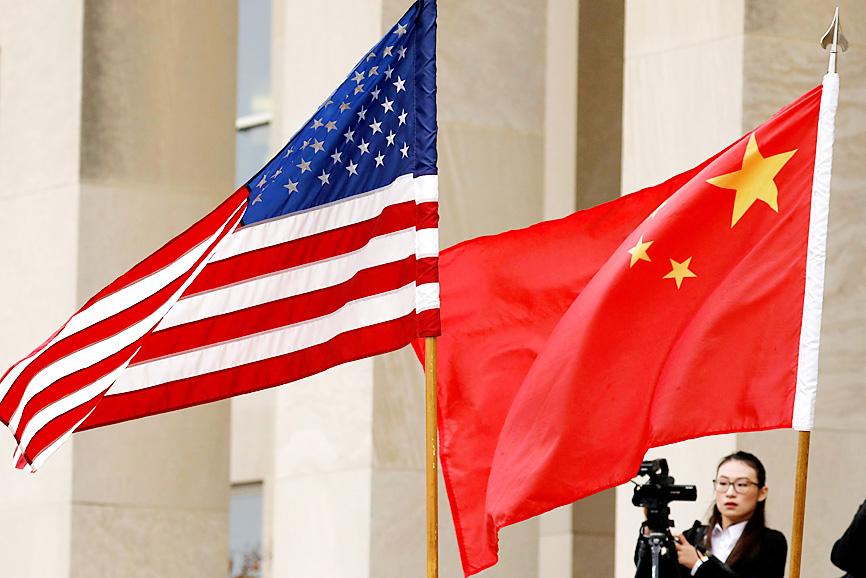The top diplomats from China and the US have exchanged stern warnings over the flashpoint issue of Taiwan, ahead of today’s hotly awaited summit between their leaders.
The virtual meeting of US President Joe Biden and Chinese President Xi Jinping (習近平) comes against a backdrop of rising tensions — in part over Taiwan.
In a telephone call on Friday with Chinese Minister of Foreign Affairs Wang Yi (王毅) to discuss preparations for the summit, US Secretary of State Antony Blinken raised concerns about Beijing’s “military, diplomatic and economic pressure” on Taiwan.

Photo: Reuters
The US Department of State said in a statement that Blinken “emphasized longstanding US interest in peace and stability across the Taiwan Strait” in the call with Wang.
Blinken “expressed concern regarding the People’s Republic of China’s continued military, diplomatic, and economic pressure against Taiwan,” and he “urged Beijing to engage in meaningful dialogue to resolve cross-Strait issues peacefully and in a manner consistent with the wishes and best interests of the people on Taiwan,” the statement read.
Wang warned of the dangers of US actions that might seem supportive of “Taiwan independence.”
“Any connivance of and support for the ‘Taiwan independence’ forces undermines peace across the Taiwan Strait and would only boomerang in the end,” Wang told Blinken, according to a readout of the call released by China yesterday.
China has ramped up military activities near Taiwan in the past few years, with a record number of planes intruding into the nation’s air defense identification zone early last month.
Washington has repeatedly signaled its support for Taiwan in the face of what it has described as Chinese aggression.
Biden has largely kept the tougher approach on Beijing of his predecessor, former US president Donald Trump, with both administrations seeing a rising China as the top challenge of the 21st century.
While the world’s top two emitters of greenhouse gases last week unveiled a surprise agreement to work together on climate change, Washington and Beijing have indicated that they would not give ground on flashpoint issues.
US officials have framed today’s summit as an opportunity to “responsibly manage competition,” while trying to cooperate in areas where the two align.
Xi last week warned against the return of Cold War-era tensions in the Asia-Pacific region.
Biden and Xi have talked by telephone twice since the veteran Democrat moved into the White House. The pair also met extensively when Biden was former US president Barack Obama’s vice president and Xi was vice president to former Chinese president Hu Jintao (胡錦濤).
Biden had hoped to meet Xi at a recent G20 summit in Rome, but the Chinese leader has not traveled since the start of the COVID-19 pandemic, and instead, agreed to hold virtual talks by the end of the year.
Additional reporting by CNA

The CIA has a message for Chinese government officials worried about their place in Chinese President Xi Jinping’s (習近平) government: Come work with us. The agency released two Mandarin-language videos on social media on Thursday inviting disgruntled officials to contact the CIA. The recruitment videos posted on YouTube and X racked up more than 5 million views combined in their first day. The outreach comes as CIA Director John Ratcliffe has vowed to boost the agency’s use of intelligence from human sources and its focus on China, which has recently targeted US officials with its own espionage operations. The videos are “aimed at

STEADFAST FRIEND: The bills encourage increased Taiwan-US engagement and address China’s distortion of UN Resolution 2758 to isolate Taiwan internationally The Presidential Office yesterday thanked the US House of Representatives for unanimously passing two Taiwan-related bills highlighting its solid support for Taiwan’s democracy and global participation, and for deepening bilateral relations. One of the bills, the Taiwan Assurance Implementation Act, requires the US Department of State to periodically review its guidelines for engagement with Taiwan, and report to the US Congress on the guidelines and plans to lift self-imposed limitations on US-Taiwan engagement. The other bill is the Taiwan International Solidarity Act, which clarifies that UN Resolution 2758 does not address the issue of the representation of Taiwan or its people in

DEFENDING DEMOCRACY: Taiwan shares the same values as those that fought in WWII, and nations must unite to halt the expansion of a new authoritarian bloc, Lai said The government yesterday held a commemoration ceremony for Victory in Europe (V-E) Day, joining the rest of the world for the first time to mark the anniversary of the end of World War II in Europe. Taiwan honoring V-E Day signifies “our growing connections with the international community,” President William Lai (賴清德) said at a reception in Taipei on the 80th anniversary of V-E Day. One of the major lessons of World War II is that “authoritarianism and aggression lead only to slaughter, tragedy and greater inequality,” Lai said. Even more importantly, the war also taught people that “those who cherish peace cannot

US Indo-Pacific Commander Admiral Samuel Paparo on Friday expressed concern over the rate at which China is diversifying its military exercises, the Financial Times (FT) reported on Saturday. “The rates of change on the depth and breadth of their exercises is the one non-linear effect that I’ve seen in the last year that wakes me up at night or keeps me up at night,” Paparo was quoted by FT as saying while attending the annual Sedona Forum at the McCain Institute in Arizona. Paparo also expressed concern over the speed with which China was expanding its military. While the US